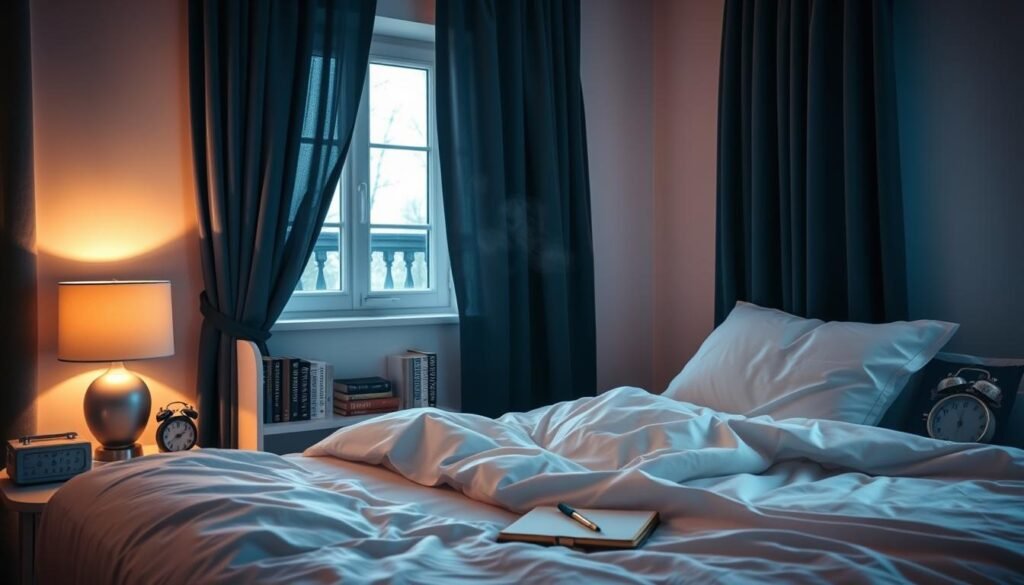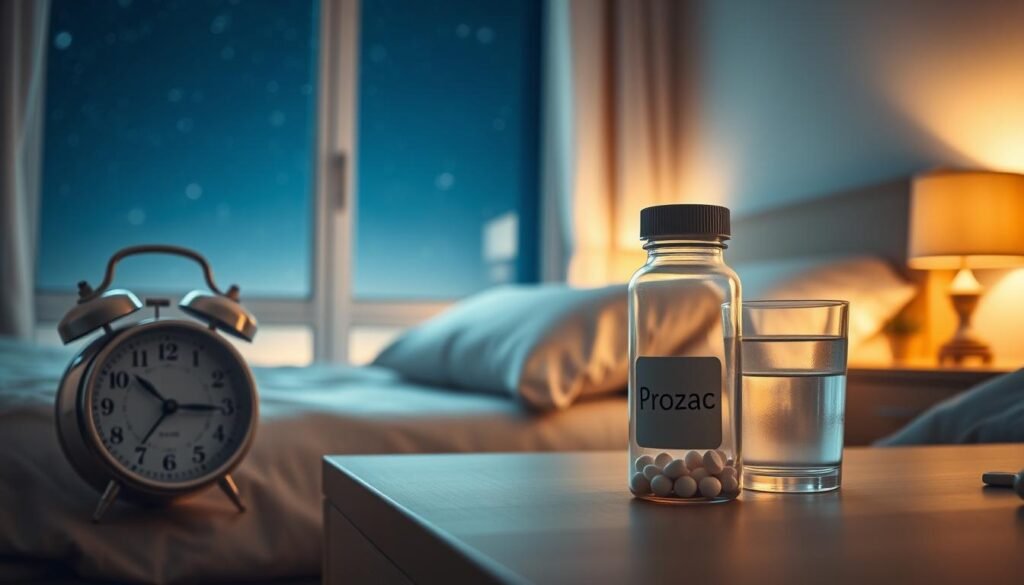Did you know up to 30% of people taking SSRIs like Prozac may face insomnia? This fact highlights a major issue with antidepressants—they can hurt your sleep. For anyone battling this, knowing what to do if Prozac leads to sleep issues is key. Insomnia doesn’t just affect your mind; it makes recovering from depression harder.
We’ll look into how Prozac and sleep troubles are linked, side effects, and give useful advice to handle these symptoms. Overcoming insomnia may sound tough, but there are Prozac insomnia remedies to help you sleep better. With the right knowledge and coping methods, you can find light even in the darkest nights of sleeplessness.
Key Takeaways
- SSRIs like Prozac can cause insomnia in around 30% of users.
- Early consultation with a healthcare provider is vital for managing side effects.
- Implementing sleep hygiene practices can significantly improve sleep quality.
- Engaging in relaxation techniques before bedtime can enhance sleep onset.
- Using natural remedies, such as melatonin supplements, may aid in overcoming insomnia.
- Monitoring medication and potential adjustments can help mitigate insomnia symptoms.
- Building a support network can provide the emotional backing needed during this time.
Understanding Prozac and Its Effects on Sleep
Prozac is the brand name for fluoxetine. It’s an important medicine for treating depression and anxiety. It works by increasing serotonin levels to help with symptoms of depression. But, it’s also crucial to understand how Prozac might affect your sleep. About 30-50% of people using SSRIs like Prozac may face insomnia. This usually happens in the first weeks of treatment.
Fluoxetine can make it harder to fall asleep. This means it could take longer to drift off. People might wake up more often and feel their sleep isn’t refreshing. Interestingly, up to 40% of Prozac users experience weird dreams or changes in their sleep cycles. This shows the complex interactions between antidepressants and sleep problems.
On the other hand, some antidepressants might help with sleep. Antidepressants like TCAs, especially amitriptyline and doxepin, can improve insomnia in depressed individuals. Therefore, it’s vital to monitor how Prozac affects sleep. If needed, the treatment can be adjusted to solve any sleep issues.
Prozac Side Effects: Insomnia Explained
Insomnia is a well-known side effect of fluoxetine, known as Prozac. People taking Prozac might find it hard to fall asleep, stay asleep, or might wake up too early. Studies show that 10-20% of Prozac users report insomnia. This is even more common in those with obsessive-compulsive disorder and bulimia nervosa, affecting 25-30% of them.
Fluoxetine can cause significant sleep disturbances for some. In the first few weeks, it might increase anxiety for some users. This can cause more insomnia at first, but it usually gets better as your body adjusts to the drug. The way Prozac causes insomnia can differ from person to person, showing why it’s key to tackle this side effect.
It’s vital to recognize the possibility of Prozac side effects insomnia to manage it effectively. It takes one to two weeks for fluoxetine to start working, but the full effects may take four weeks or more. If you’re still having sleep issues after a month, talk to a doctor to find the best solution. Being aware and taking steps early can help reduce insomnia from this medication.
| Condition Treated | Insomnia Occurrence |
|---|---|
| General use | 10-20% |
| Depressive disorders | 20-25% |
| OCD | 25-30% |
| Bulimia nervosa | 30% |
| Panic disorder | 25-30% |
What to Do If Prozac Causes Insomnia
Dealing with insomnia while on Prozac is a common problem. Spotting the signs of insomnia early is key to manage it well. These signs include trouble sleeping, waking up often, and feeling tired all day. Knowing how these symptoms link to Prozac can help patients seek the right help.
Identifying Symptoms of Prozac-Induced Insomnia
It’s crucial to notice if Prozac causes sleep issues. You might feel restless at night or wake up a lot. This bad sleep can make you very tired, affecting your whole day. Paying attention to your sleep and any mood or energy shifts is important. This helps understand Prozac’s effect on your sleep.
Consulting with Your Healthcare Provider
It’s important to talk to a doctor about any sleep problems. A good talk can lead to a better plan to tackle insomnia from Prozac. They might adjust your dose or suggest other medicines. They can also offer tips to sleep better while on Prozac. Having these chats helps take care of your overall health.
Strategies for Managing Prozac-Induced Insomnia
To handle prozac insomnia, adopt a broad strategy focusing on bettering sleep quality. Good sleep hygiene can ease insomnia, making sleep more fulfilling. If you stick to a planned routine, you can enhance your sleep and lessen insomnia.
Sleep Hygiene Practices
For sleep hygiene, keep a steady bedtime and ensure your sleeping space is inviting. Regular sleeping habits align your internal clock, and a peaceful place reduces sleep disruptions. Let’s look at some key steps:
- Go to bed and wake up at the same time each day.
- Avoid screens for at least an hour before bedtime to reduce blue light exposure.
- Keep the bedroom dark, quiet, and at a comfortable temperature.
- Limit caffeine and heavy meals close to bedtime.
Following these steps can help tackle prozac insomnia and promote tranquil sleep.
Relaxation Techniques Before Bedtime
Adding relaxation activities before bed can ease the shift into sleep. Doing soothing activities tells your body it’s time to rest. Here are some helpful techniques:
- Deep breathing exercises to promote relaxation.
- Gentle yoga or stretching to relieve tension.
- Reading a light book or listening to soothing music.
Creating a relaxing bedtime routine informs your body it’s sleep time, fostering a rest-friendly atmosphere. Integrating these habits into your life can improve well-being and fight insomnia.

Prozac Insomnia Remedies: Natural Approaches
Managing insomnia due to Prozac can be done with natural strategies. These methods can boost sleep quality and make you feel better. Adding herbal supplements for insomnia to your night routine is a good idea. It offers a natural alternative to using medicines.
Herbal Supplements and Their Efficacy
Certain natural remedies for Prozac could help with sleep issues. German chamomile, for example, helps lower anxiety and depression. A study in 2020 showed that taking 1,500 milligrams of chamomile extract daily for eight weeks really helped people’s mental health. Lavender oil is also great for calming down. It’s useful for mild to moderate depression as a support treatment.
Other herbs to consider are:
- 5-hydroxytryptophan (5-HTP) – it may reduce depression.
- St. John’s wort – known to help with depression for centuries.
- Asian ginseng – has shown antidepressant qualities in animal tests.
Talking to a doctor before starting any herbs is key. Healthcare advice is crucial. Supplements aren’t strictly controlled by the FDA. This means their quality and effectiveness can vary.
Creating a Calming Bedtime Routine
A calming bedtime routine can make a big difference in your sleep. Having a regular pattern tells your body it’s time to relax. Try adding these to your night rituals for better sleep:
- Turn down the lights an hour before sleeping to help relax.
- Listen to calm music or nature sounds to quiet the mind.
- Do some gentle stretching or yoga to loosen up.
A peaceful environment can ease the sleep issues from Prozac. Sticking to these bedtime rituals for sleep, you might find yourself resting better. And, you could see an overall improvement in how well you sleep.
Coping with Prozac Insomnia: Behavioral Techniques
It can be tough to deal with insomnia from taking Prozac. Yet, certain behavioral techniques can make a big difference. Cognitive behavioral therapy for insomnia and mindfulness can really help with relaxation.
Cognitive Behavioral Therapy for Insomnia
Cognitive Behavioral Therapy for Insomnia, or CBT-I, helps you change unhelpful thoughts and actions affecting your sleep. It focuses on improving your sleep habits and environment. Using strategies like sleep restriction, stimulus control, and thinking differently about sleep can be helpful for those with insomnia from Prozac. CBT-I gives you tools to handle sleep issues better in the long run. For more info on Prozac and its effects, check out this resource.
Mindfulness and Meditation Practices
Mindfulness and meditation can really improve your sleep. They focus on living in the moment, which lowers anxiety linked to insomnia. Things like deep breathing and imagining peaceful scenes help you relax and sleep better.
Using meditation regularly can bring peace, quieting thoughts that keep you awake. If Prozac side effects trouble you, adding these practices to your bedtime can change your sleep for the better.

| Technique | Benefits | Suggested Practices |
|---|---|---|
| Cognitive Behavioral Therapy for Insomnia | Addresses underlying thoughts and behaviors; promotes healthier sleep | Sleep restriction, stimulus control, cognitive restructuring |
| Mindfulness | Reduces anxiety; enhances relaxation and focus | Deep breathing, guided imagery, body scan |
| Meditation | Improves sleep quality; calms the mind | Mindfulness meditation, visualization, progressive muscle relaxation |
These techniques offer helpful ways to manage insomnia from Prozac. They bring hope and better sleep.
Consulting With Your Doctor About Alternatives to Prozac
Patients dealing with insomnia due to Prozac may want to explore alternatives to prozac with their doctor. There are various other antidepressants that might help without causing sleep problems. Talking with your healthcare provider can help you find the right medication for your health needs.
Evaluating Other Antidepressant Options
When you talk to your doctor, make sure to discuss other antidepressants with doctor. Zoloft is one option that’s FDA-approved for various conditions and usually causes fewer side effects. Looking into different medications may improve your sleep and keep your mental health steady.
Discussing Discontinuation Strategies
If insomnia persists, it’s important to consider discontinuation strategies for prozac. Stopping Prozac safely typically involves a slow reduction under a doctor’s watch. This careful approach helps prevent withdrawal symptoms and ensures a smooth transition to new treatments.
Managing Sleep Problems While on Prozac
Having trouble sleeping while taking Prozac is common. A doctor can help by adjusting Prozac dosage or changing when you take it. This can make sleep much better. Some may need to take Prozac earlier, while others might need a smaller dose to sleep well at night.
Adjusting Dosage or Timing of Medication
It’s key to work with a doctor to find the right balance. Bad sleep can make depression worse. This shows why managing sleep on Prozac is important. Finding the right mix can improve your sleep and make you feel better overall.
Additional Medications to Aid Sleep
Sometimes, doctors might prescribe medications for sleep while on Prozac. They might suggest small doses of certain antidepressants like mirtazapine or trazodone. But, it’s very important to use these sleep aids carefully. Each drug has its own risks, so a doctor should check them first.

To learn more about handling sleep problems with Prozac, visit this link: Managing Sleep Disturbances with Prozac Treatment.
Treating Insomnia on Prozac: Professional Guidance
Dealing with insomnia on Prozac calls for a well-rounded plan. This includes regular check-ups with healthcare experts. These visits are key for those dealing with sleep trouble on Prozac. They let doctors make any needed changes to your treatment. This ensures both your mental health and sleep are taken care of.
Importance of Ongoing Monitoring and Support
Keeping a close watch on Prozac insomnia is crucial. When patients mention sleep problems, it’s time for doctors to take another look. They might adjust the dose or suggest new solutions. Doing this helps tackle all symptoms, sleep-related ones too. Getting help for sleep issues might lead you to sleep clinics or support groups. They provide specific advice on dealing with the side effects of antidepressants.
Finding a Support Network
Building a network for support can really make a difference. Talking with others who understand can give you strength. This kind of sharing builds resilience. It helps you learn and use new ways to cope. Finding support, whether online or in person, breaks the feeling of being alone. Talking about your sleep troubles with family and friends also helps. Their support boosts your spirit when you need it.
| Aspect | Details |
|---|---|
| Regular Follow-Ups | Essential for addressing dosage adjustments and therapy evaluations. |
| Support Options | Include sleep clinics, therapy groups, and community resources. |
| Peer Engagement | Sharing experiences helps build emotional resilience. |
| Involvement of Loved Ones | Encouragement from friends and family aids emotional support. |
Conclusion
Facing Prozac insomnia is tough, with 7% to 22% of patients having sleep problems due to fluoxetine. Knowing the side effects is key to managing them well. Luckily, there are many ways to help, like better sleep hygiene and relaxation techniques.
Talking to doctors is very important for finding the right solution, especially if sleep issues start early on. Since many fluoxetine patients are around 25 years old, it’s crucial for them to look after their sleep. They should not hesitate to get all the help they need.
Using supportive therapies and keeping an eye on sleep patterns can greatly improve sleep quality. In the end, peaceful sleep can be achieved. This empowers those dealing with Prozac-related insomnia to improve their lives.